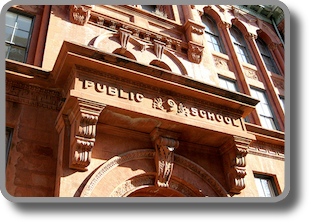Problems w/ Secular Education
09/2018 Problems w/ Secular Ed

SACE strongly supports Christian education as a parental concern and a source of strong civic nurture. It is clear that a much higher percentage of the nation’s families would elect a Christian school education for their children if the financial “paying field” was level. If secular education had a minimal effect on Christian children, SACE would not support religious school choice because choice systems will inevitably involve additional government regulation upon religious schools. However, secular education greatly hinders the spiritual, moral, and intellectual development of children.
For over a century and a half, the public has supported education to insure that children become moral, knowledgeable, skilled, independent, reflective, and civically involved individuals. After a century of experimentation with the "educational tools" associated with a "secular" paradigm of education, it is increasingly clear that many of the publics educational goals are religious in nature and are best addressed in religious schools. To make religious schools accessible to all families, we believe public education must be reshaped from a "common education" system to a "plural education" system in which children will be able to attend publicly supportive, and privately operated schools that educate from religious perspectives.
Post a comment about: "The problems with secular education."
America has preferentially supported secular schools for two primary reasons. One regards the church-state issue; the other the belief that secular education can adequately nurture children with the morality and academic skills necessary to become strong and productive citizens.
Under the church-state category, I address the first reason. Here, I open discussion regarding the success of secular education to nurture morality and other vital social qualities. After over a century of educational experimentation under modernity’s confidence regarding a secular educational paradigm, I argue that growing research finds many weaknesses with secular education and few feared weaknesses associated with religious schooling.
Religious schools were once feared to promote social division, to breed shallow and dependent thinking, and to stifle individual expressive development. Though we may each envision the narrowness and control of a few infamous religious schools, over two centuries of practice provides little evidence of the social undesirability of religious schooling. They are not linked with division, and the children of home and private school religious educations generally reflect a great depth of independent philosophical thinking and acting.
However, a defense of religious schooling is not my main point. I argue that secular schooling provides a weak foundation for civic development. In spite of the care and commitment of well trained and hard working teachers, secular educational environments hamper educational efforts and undermine social health.
Though religious schools have their own needed areas of growth, the Church-State concerns attached to the current public school model provide barriers with little flexibility. The human qualities that remain an educational concern to strengthen society are religious by nature, and they are poorly addressed within secular schools.
Under the church-state category, I address the first reason. Here, I open discussion regarding the success of secular education to nurture morality and other vital social qualities. After over a century of educational experimentation under modernity’s confidence regarding a secular educational paradigm, I argue that growing research finds many weaknesses with secular education and few feared weaknesses associated with religious schooling.
Outdated Beliefs about Religious Schooling
Religious schools were once feared to promote social division, to breed shallow and dependent thinking, and to stifle individual expressive development. Though we may each envision the narrowness and control of a few infamous religious schools, over two centuries of practice provides little evidence of the social undesirability of religious schooling. They are not linked with division, and the children of home and private school religious educations generally reflect a great depth of independent philosophical thinking and acting.
However, a defense of religious schooling is not my main point. I argue that secular schooling provides a weak foundation for civic development. In spite of the care and commitment of well trained and hard working teachers, secular educational environments hamper educational efforts and undermine social health.
Weaknesses of Secular Education
In brief, by remaining aloof from the foundations of value and truth, secular schools have difficulty:- Nurturing student morality,
- Building the complex reasoning skills needed to address the issues of democratic society,
- Promoting the growth of “social capital” – social trust – linked with healthy society, and
- Motivating students toward a concern for the good of others.
Though religious schools have their own needed areas of growth, the Church-State concerns attached to the current public school model provide barriers with little flexibility. The human qualities that remain an educational concern to strengthen society are religious by nature, and they are poorly addressed within secular schools.
Society for the Advancement of Christian Education
blog comments powered by Disqus
